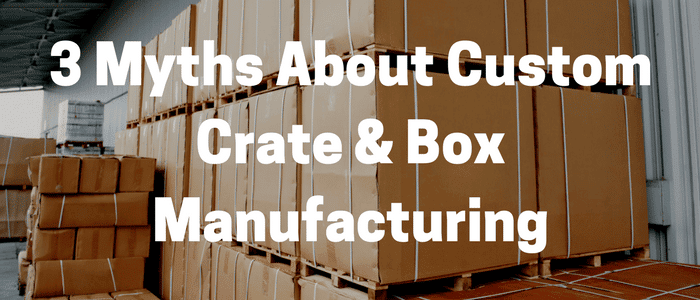Three Myths About Custom Crate & Box Manufacturing
What is Custom Package Manufacturing and How Can It Help My Business?
When it comes to procuring crates and boxes to protect your products, you have two options: standard-size “stock boxes” from a distributor or custom ordering from a manufacturer. You can either work with a distributor to get standard size packaging in bulk, or you can work with a crate or box manufacturer to get the perfect package for your product. Each has benefits and draw backs, but there are also some misconceptions about custom crate and box manufacturing that we want to dispel. This article will explain the differences between these two options and will go on to bust three of the common myths about custom crate and box manufacturing. Ultimately, we want to help you make an informed decision about which option is right for your business.
Standard Size Packaging
Ordering packaging through a distributor often seems like the easiest option. Distributors make it easy to order hundreds or thousands of boxes with only a few clicks. Shipping costs are low and you can add your branding to the box without too much hassle. Also, if you buy in bulk, the price per unit is usually very reasonable. Due to the convenience and economy of bulk ordering, many businesses design and manufacture products with standard package sizes in mind so that they can take their products to market using pre-manufactured packaging. But even if you think you’ve scored a great deal with a bulk distributor, we’ll see later in this article how you might also be accumulating costs in ways you haven’t considered.
Custom Crate and Box Manufacturing
Custom crate and box manufacturing means not ordering through a distributor. Instead, you would have a crate or box manufacturer design and fabricate the packaging to meet your specific needs. Usually this option is more expensive per unit, but you can order the exact number of units that you require. More than that, you have the expertise of the manufacturer to advise you on the particular size, weight, design, and protective features that your box or crate will utilize to protect your product in shipment and present it well to the end user.
Now we’ll examine some of the commonly held myths about working with a distributor versus a crate or box manufacturer.
Myth one: Standard sizes are always cheaper.
Sometimes you look at the price per unit and you think, “that’s the cheapest option, let’s go with that.” We understand this thinking and really there’s nothing inherently wrong with it. But in order to get that great price per unit you have to: 1) order more boxes than you need which means that you must find a way to store the boxes as well (without letting them get damaged), and 2) work with boxes that may not be the perfect ones for the job. Since you can’t fit the product into an undersized box you are forced to go with an oversized box which then requires more internal cushioning and packing time. When you then calculate the added costs associated with warehousing, damaged stock from long-term storage, and damaged products due to minor incompatibilities between the product and the package, you often come out with a different total cost per item shipped. On the other hand, custom crate manufacturers can do small orders for you so that you can keep your operation streamlined with just-in-time packaging arriving when you need it. We can also custom manufacture the package so you get exactly what you need. All of this saves money, time, and hassle often with reduced damage.
Myth two: Using a distributor will be faster.
Not necessarily. If you develop a relationship with a custom packaging manufacturer, then turn-around times for custom orders can be very fast. Though they are “custom” crates for the first order, they become your “standard” crates for the manufacturer for ongoing orders. Also, you can work with someone located in your area so that shipping times are negligible. The trick is to work with a manufacturer that you can develop a relationship with over time, so they know exactly what you need, have the materials on hand and are able to produce to your schedule.
Myth three: Packaging only needs to be “good enough,” not “perfect.”
Standard-size packaging can be a quick solution to solving packaging needs, but custom packages do a lot more to both protect your product and to present it well to the end-user. This allows you to differentiate from the competition and to project an image of your product as being unique and valuable. The packaging is the first thing that people see when they receive your product. Everything from custom mil-spec crates to uniquely designed cardboard boxes project an image of what is inside that gives the product value. But it is not just the presentation of the product that custom manufactured packaging enables; it is also optimized to protect your product in exactly the way it needs to be protected. Products that are fragile, oddly shaped, or contain special vulnerable parts should have packaging that is perfectly optimized to protect them from the hazards of shipping. When end-users see the care and effort that went into protecting your product, their interest and respect for your work increases, and the product works in the way it was intended.
Conclusion
While bulk packaging distributors can often offer the lowest price per unit for packaging your products, these cheap units create other costs and problems down the road. A local, competitive packaging manufacturer may be a better option for companies interested in putting their best foot forward and protecting their products to the best possible degree. Get in touch with us at Reid Packaging to see what custom manufactured packaging could mean for your business.

